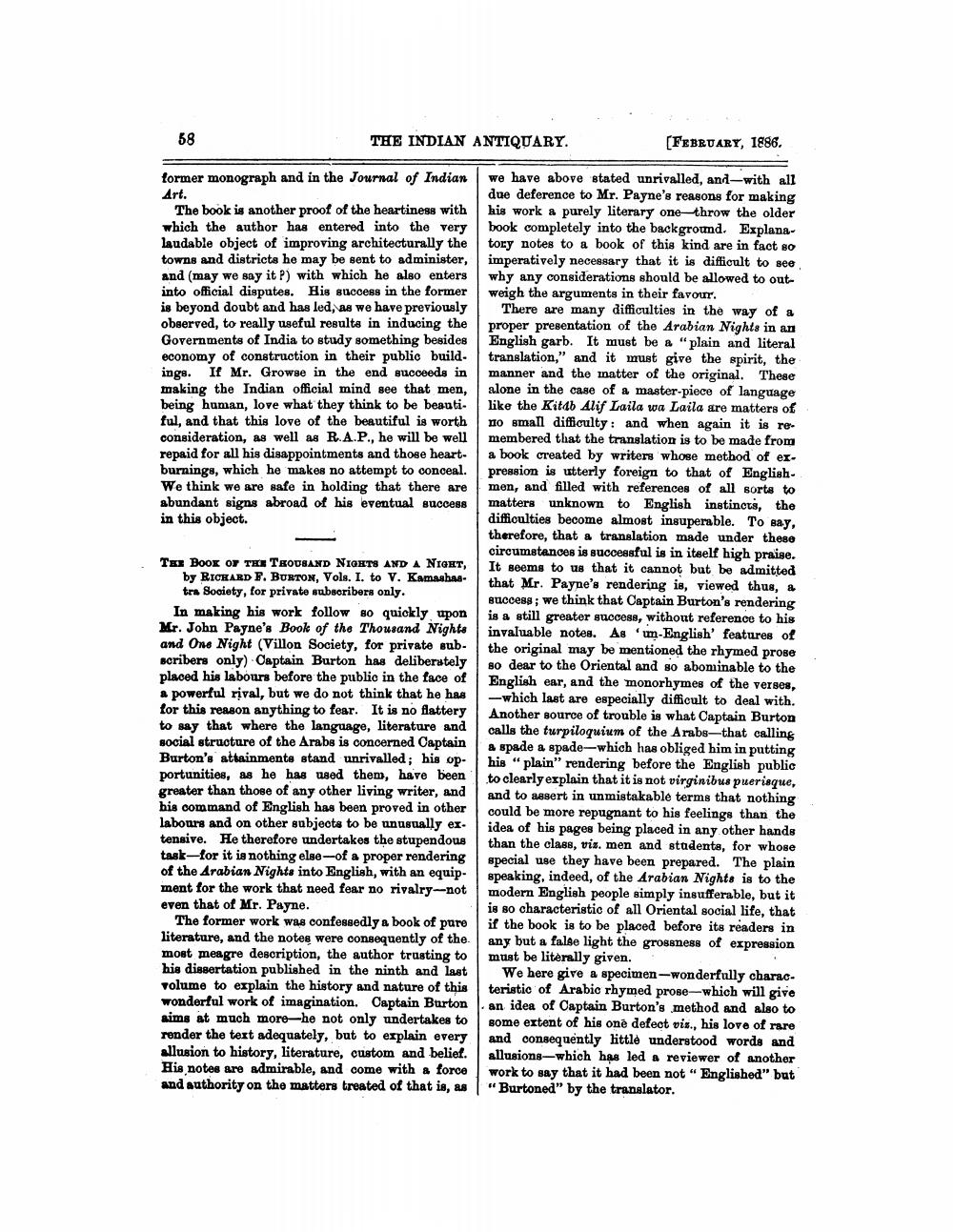________________
58
THE INDIAN ANTIQUARY.
(FEBRUARY, 1886.
former monograph and in the Journal of Indian Art.
The book is another proof of the heartiness with which the author has entered into the very laudable object of improving architecturally the towns and districts he may be sent to administer, and (may we say it P) with which he also enters into official disputes. His success in the former is beyond doubt and has led, as we have previously observed, to really useful results in inducing the Governments of India to study something besides economy of construction in their public build. ings. If Mr. Growse in the end succeeds in making the Indian official mind see that men, being human, love what they think to be beauti- ful, and that this love of the beautiful is worth consideration, as well as R.A.P., he will be well repaid for all his disappointments and those heart. burnings, which he makes no attempt to conceal. We think we are safe in holding that there are abundant signs abroad of his eventual success in this object.
TE BOOK OF THE TROUSAND NIGHTS AND A NIGHT,
by RICHARD F. BURTON, Vols. I. to V. Kamasha
tra Society, for private subscribers only. In making his work follow 80 quickly upon Mr. John Payne's Book of the Thousand Nights and One Night (Villon Society, for private subscribers only) Captain Burton has deliberately placed his labours before the public in the face of * powerful rival, but we do not think that he has for this reason anything to fear. It is no flattery to say that where the language, literature and social structure of the Arabs is concerned Captain Burton's attainmente stand unrivalled; his opportunities, as he has used them, have been greater than those of any other living writer, and his command of English has been proved in other labours and on other subjects to be unusually ex. tensive. He therefore undertakes the stupendous task-for it is nothing else-of a proper rendering of the Arabian Nights into English, with an equip. ment for the work that need fear no rivalry--not even that of Mr. Payne.
The former work was confessedly a book of pure literature, and the notes were consequently of the most meagre description, the author trusting to his dissertation published in the ninth and last volume to explain the history and nature of this wonderful work of imagination. Captain Burton aims at much more-he not only undertakes to render the text adequately, but to explain every allusion to history, literature, custom and belief. His notes are admirable, and come with a force and authority on the matters treated of that is, as
we have above stated unrivalled, and with all due deference to Mr. Payne's reasons for making his work a purely literary one-throw the older book completely into the background. Explanatory notes to a book of this kind are in fact so imperatively necessary that it is difficult to see why any considerations should be allowed to outweigh the arguments in their favour.
There are many difficulties in the way of a proper presentation of the Arabian Nights in an English garb. It must be a "plain and literal translation," and it must give the spirit, the manner and the matter of the original. These alone in the case of a master-piece of language like the Kitab Alif Laila wa Laila are matters of no small difficulty: and when again it is remembered that the translation is to be made from a book created by writers whose method of ex. pression is utterly foreign to that of Englishmen, and filled with references of all sorts to matters unknown to English instincts, the difficulties become almost insuperable. To say, therefore, that a translation made under these circumstances is successful is in itself high praise. It seems to us that it cannot but be admitted that Mr. Payne's rendering is, viewed thus, & Guccess; we think that Captain Burton's rendering is a still greater success, without reference to his invaluable notes. As 'um-English' features of the original may be mentioned the rhymed prose 80 dear to the Oriental and so abominable to the English ear, and the monorhymes of the verses, -which last are especially difficult to deal with. Another source of trouble is what Captain Burton calls the turpiloquium of the Arabs-that calling & spade a spade-which has obliged him in putting his "plain" rendering before the English public to clearly explain that it is not virginibus puerisque, and to assert in unmistakable terms that nothing could be more repugnant to his feelings than the idea of his pages being placed in any other hands than the class, vis, men and studente, for whose special use they have been prepared. The plain speaking, indeed, of the Arabian Nights is to the modern English people simply insufferable, but it is so characteristic of all Oriental social life, that if the book is to be placed before its readers in any but a false light the groseness of expression must be literally given.
We here give a specimen--wonderfully characteristic of Arabic rhymed prose--which will give - an idea of Captain Burton's method and also to some extent of his one defect vit., his love of rare and consequently little understood words and allusions-which has led a reviewer of another work to say that it had been not "Englished" but "Burtoned by the translator.




